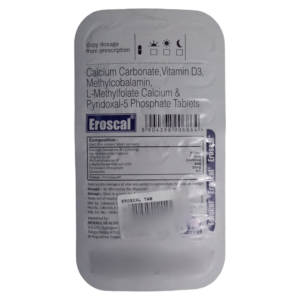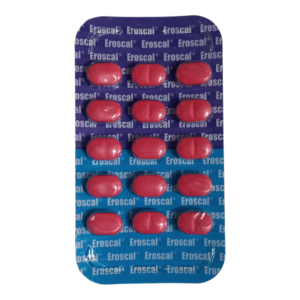CALCIUM CARBONATE + METHYLCOBALAMIN + METHYCOBALAMIN + VITAMIN D3 (CHOLECALCIFEROL) + L-METHYLFOLATE + PYRIDOXAL-5-PHOSPATE
Calcium Carbonate: Calcium Carbonate is a medication that contains calcium, an essential mineral needed for various functions in the body. It is commonly used as a dietary supplement to provide adequate calcium intake or as an antacid to relieve symptoms of heartburn, acid indigestion, and upset stomach.
The mechanism of action of Calcium Carbonate as an antacid involves neutralizing excess stomach acid, reducing the acidity in the stomach, and alleviating symptoms of acid reflux. As a dietary supplement, it helps in maintaining proper bone health and preventing conditions like osteoporosis.
The recommended dose of Calcium Carbonate as an antacid varies depending on the severity of symptoms and individual response. Generally, adults can take 500-1500mg of calcium carbonate (equivalent to 200-600mg of elemental calcium) after meals or as needed. However, it is important to follow the dosage instructions provided by the healthcare professional or stated on the package.
Some common side effects of Calcium Carbonate may include constipation, gas, bloating, and stomach cramps. These side effects are usually mild and temporary but if they persist or worsen, it is advisable to seek medical attention. In rare cases, high doses of calcium carbonate may lead to hypercalcemia (elevated calcium levels in the blood), kidney stones, or milk-alkali syndrome (characterized by excessive calcium intake). It is important to inform your healthcare provider about any existing medical conditions or medications you are taking to prevent potential drug interactions or adverse effects.
Overall, Calcium Carbonate is a widely used medication with significant benefits as a calcium supplement and an antacid. Nevertheless, it is important to use it responsibly and under the guidance of a healthcare professional to minimize potential risks and maximize its effectiveness.
Methylcobalamin: Methylcobalamin, also known as vitamin B12, is a naturally occurring form of vitamin B12. It plays a crucial role in the formation of red blood cells, DNA synthesis, and the normal functioning of the nervous system.
Methylcobalamin is commonly used as a dietary supplement to address vitamin B12 deficiency, which can occur due to various factors such as poor diet, certain medications, malabsorption issues, or medical conditions affecting the gastrointestinal tract. It is also prescribed to individuals with pernicious anemia or neuropathies associated with vitamin B12 deficiency.
The mechanism of action of methylcobalamin involves its conversion into coenzyme B12, which is essential for the synthesis of methionine from homocysteine. This methylation process is vital for normal cell division and DNA synthesis. It also helps maintain the protective covering of nerve cells called the myelin sheath, which is essential for proper nerve function.
The dose of methylcobalamin varies depending on the individual’s age, medical condition, and severity of vitamin B12 deficiency. Typically, it is administered orally or injected. The common oral dose for adults is 1-2 mg per day. In the case of deficiency, the initial treatment phase may involve higher doses, which is then followed by a maintenance dose.
Methylcobalamin is generally considered safe and well-tolerated. However, like any medication, it may cause some side effects in certain individuals. Common side effects include nausea, vomiting, diarrhea, allergic reactions, itching, rash, dizziness, and headache. If any severe or persistent side effects occur, it is important to consult a healthcare professional.
It is worth noting that methylcobalamin is the preferred form of vitamin B12 supplementation for individuals with impaired methylation ability, as it does not require conversion in the body like other forms of vitamin B12. However, it is always recommended to consult a healthcare professional before starting any new medication or supplement.
Methycobalamin: Methycobalamin is a form of vitamin B12 that is used as a dietary supplement or medication to treat vitamin B12 deficiency, nerve damage, and certain types of anemia. It is typically administered through oral tablets or as an injection.
The primary mechanism of action of Methycobalamin is to act as a coenzyme in the body, playing a key role in the synthesis of DNA, RNA, and proteins. It is essential for the growth, repair, and proper functioning of nerve cells, and it helps in the production of red blood cells.
The dosage of Methycobalamin varies depending on the condition being treated. For vitamin B12 deficiency, the usual dose is 1,000 to 2,500 micrograms per day. For neurologic symptoms, the dose may be increased to 5,000 to 10,000 micrograms per day for a few weeks.
Methycobalamin is generally well-tolerated by most individuals. However, like any medication, it can have side effects. Common side effects may include mild diarrhea, itching, rash, headache, dizziness, and nausea. These effects are usually temporary and subside on their own.
In rare cases, allergic reactions may occur, characterized by symptoms such as hives, difficulty breathing, swelling of the face, lips, tongue, or throat. If any of these severe allergic reactions occur, immediate medical attention should be sought.
It is important to note that Methycobalamin may interact with certain medications such as anticonvulsants, antibiotics, and certain cancer drugs. Therefore, it is crucial to inform your healthcare provider about all the medications you are taking before starting Methycobalamin.
Overall, Methycobalamin is a safe and effective medication used for the treatment of vitamin B12 deficiencies and associated conditions. It is important to follow the prescribed dosage and discuss any concerns or potential interactions with a healthcare professional.
Vitamin D3 (cholecalciferol): Vitamin D3 (cholecalciferol) is a fat-soluble vitamin that plays a crucial role in maintaining healthy bones and teeth. It is primarily used to treat and prevent vitamin D deficiency, a condition that can lead to weakened bones, osteoporosis, and rickets.
Mechanism of action: Cholecalciferol functions as a prehormone and is converted into its active form, calcitriol, in the liver and kidneys. Calcitriol acts as a hormone that regulates calcium and phosphorus levels in the body. It enhances the absorption of calcium from the gut, promotes the reabsorption of calcium from the kidneys, and stimulates osteoblast activity (cells responsible for bone formation).
Dose: The recommended dose of vitamin D3 varies depending on age, individual needs, and severity of deficiency. For adults, the typical dose to treat deficiency ranges from 1000 to 5000 international units (IU) per day. However, dosages may be higher in cases of severe deficiency or under medical supervision.
Side effects: Vitamin D3 is generally safe when taken at recommended doses. However, high doses can lead to vitamin D toxicity, also known as hypervitaminosis D. Symptoms of toxicity include nausea, vomiting, constipation, poor appetite, weight loss, weakness, and increased thirst or urination. Prolonged excessive intake of vitamin D can result in hypercalcemia (high levels of calcium in the blood), which may cause symptoms such as confusion, lethargy, and kidney problems.
It’s important to note that maintaining optimal vitamin D levels is beneficial, but excessive supplementation without medical supervision can be harmful. It is always recommended to consult a healthcare professional for proper dosing and monitoring of vitamin D3 supplementation.
L-Methylfolate: L-Methylfolate, also known as Levomefolic acid or 5-MTHF, is a type of B-vitamin, specifically a form of folate. It is used as a medical supplement to treat folate deficiency, which can occur due to malnutrition, poor absorption, certain medications, or specific genetic conditions.
The primary function of L-Methylfolate is to provide the body with an active form of folate, which is crucial for various processes in the body including DNA synthesis, red blood cell production, and neurotransmitter synthesis. By providing the active form of folate directly, L-Methylfolate bypasses the need for it to be converted by the body, making it effective even in individuals with impaired folate metabolism.
L-Methylfolate is commonly prescribed for the treatment of major depressive disorder, particularly for individuals who have a diminished ability to convert standard folate into its active form. It can also be used as an adjunct treatment for schizophrenia and bipolar disorder.
The dosage of L-Methylfolate may vary depending on the individual and the condition being treated. Generally, for depression, the starting dose is 7.5 mg per day, gradually increasing to 15 mg per day if necessary. However, a healthcare professional should determine the appropriate dose based on the specific needs of the patient.
As with any medication, L-Methylfolate has possible side effects. Some individuals may experience mild side effects such as nausea, headache, dizziness, or gastrointestinal discomfort. In rare cases, allergic reactions and skin rashes can occur. If any severe or persistent side effects occur, it is important to consult a healthcare professional for guidance.
Overall, L-Methylfolate is a well-tolerated and generally safe medication used to supplement folate levels in individuals who cannot efficiently convert standard folate into its active form. It is most commonly prescribed for the treatment of depression, especially for those with impaired folate metabolism. It is important to follow the recommended dosage and consult a healthcare professional before starting or making any changes to the medication.
Pyridoxal-5-Phospate: Pyridoxal-5-Phosphate (P5P) is the active form of vitamin B6 that plays a crucial role in various enzymatic reactions in the body. It is an essential coenzyme required for the metabolism of proteins, carbohydrates, and fats.
P5P is primarily used as a dietary supplement to treat vitamin B6 deficiency and related conditions. It is also used in the treatment of certain genetic disorders that impair the normal metabolism of vitamin B6.
The mechanism of action of P5P is related to its role as a coenzyme. It participates in over 100 enzymatic reactions, including the synthesis of neurotransmitters such as serotonin, dopamine, and gamma-aminobutyric acid (GABA). These neurotransmitters are important for maintaining optimal brain function and mood regulation. P5P is also involved in the synthesis of hemoglobin, which is essential for the formation of red blood cells.
The recommended dose of P5P varies depending on the individual’s needs and the condition being treated. It is available in various strengths, including 25 mg, 50 mg, and 100 mg. It is typically taken orally, and the dosage is often determined by a healthcare professional.
Like any medication or supplement, P5P may have side effects. Common side effects may include gastrointestinal issues such as nausea, upset stomach, and diarrhea. However, these side effects are generally mild and temporary. Rarely, some individuals may experience allergic reactions or hypersensitivity to P5P.
It is important to consult a healthcare professional before starting any new medication or dietary supplement, including P5P, to ensure it is appropriate for your specific situation and to determine the correct dosage.


